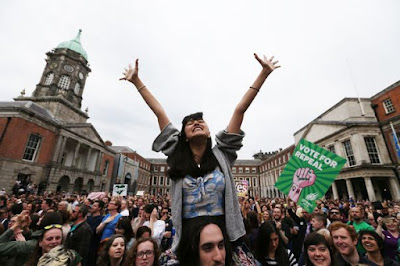New Ireland: Freedom From Religion
NEW IRELAND: FREEDOM FROM RELIGION
The past few years have seen a new Ireland emerge.
Two referenda and one papal visit have all been revealing.
"Ireland has shown it’s face."1
What has emerged is a strong desire to be free from the past shame and suffering caused by religion and to move on. TD Kate O Connell strikingly claimed, “Ireland’s most Catholic times were it’s least Christian” She spoke strongly of women and children suffering under those in power wielding authority.2
When Pope Francis was welcomed by Taoiseach Leo Varadkar he was reminded of Ireland’s past. “In place of Christian charity, forgiveness and compassion, far too often there was judgement, severity and cruelty, in particular, towards women and children and those on the margins.”3
A country known for being Christian had been shown to be anything but. The past weighs heavily. No wonder there is the desire to move on. A desire which not only showed itself in the discussions around the referenda, but was surely also expressed in the celebrations that greeted the results.
“And it’s goodbye to all that. It was not a pretty church. It became dominant, arrogant, abusive. It betrayed its teaching and the people, abused their children, and facilitated that abuse through covering it up to protect itself.”4 said Patsy McGarry in the Irish Times.
So we have moved on, but from what exactly? From the church, from Christianity, from any form of institutional or organised faith?
What is ironic is that it could be argued that the values that have resulted in a movement away from the Christian faith find their very foundations there. “Irish Catholics remain faithful, generous and compassionate, despite all. It is because of such compassion they voted so overwhelmingly for same-sex marriage in 2015 and to remove the Eighth Amendment last May.”4 suggests McGarry.
What is ironic is that it could be argued that the values that have resulted in a movement away from the Christian faith find their very foundations there. “Irish Catholics remain faithful, generous and compassionate, despite all. It is because of such compassion they voted so overwhelmingly for same-sex marriage in 2015 and to remove the Eighth Amendment last May.”4 suggests McGarry.
This is not the place to rehash the rights and wrongs of these referenda and, to be fair, it should be recognised that many of those on the other side of the results in these referenda showed compassion and kindness in their decision making and relating to those on ‘the other side’.
There’s no doubt it’s time to move on and be free from how Christianity has been expressed and practised in this period, but does this mean moving on from the Christian faith itself? “Christianity has been in Ireland for over 1,500 years; the Church that Paul Cullen built lasted one tenth of that time, about 150 years.”4 McGarry states.
The values of being compassionate and kind to those who are most vulnerable and weak were central to Jesus ministry. In writing his account of Jesus’ life, Luke decided to place Jesus’ words spoken in his hometown at the front of his ministry- as a lens through which to view and understand all that would come- Luke 4.16-21.
He had come to “….proclaim good news to the poor…” which as Luke’s gospel unfolds are shown to be more than those in financial poverty, but all who were on the outside, marginalised or struggling with life.
He had also come to bring freedom. “…He has sent me to proclaim freedom for the prisoners and recovery of sight for the blind, to set the oppressed free,to proclaim the year of the Lord’s favour.” The year of the Lord’s favour was the year of Jubliee, when every fifty years the Jews would release those in debt and those who had sold themselves into slavery.
Jesus had come to bring freedom. As the gospel continues it is the religious leaders who Jesus contests with most. He had come to bring freedom from religion- religion in the sense of a system of rules applied by men to seemingly keep God happy, but which only weighed people down.“…But do not do what they do, for they do not practice what they preach. They tie up heavy, cumbersome loads and put them on other people’s shoulders, but they themselves are not willing to lift a finger to move them.” Matthew 23.3-4. Jesus had come to bring freedom for those struggling under the weight of religion.
It may sound surprising and strange to our ears, but could it be that the freedom from religion we are looking for is discovered in moving towards Jesus, not moving on from him?
Perhaps the way for us to move on is to recover something that has been lost?
1 Marriage Referendum: Ireland sends a message of true equality and inclusiveness to the world
Irish Times May 25 2018
2 "Abortion debate: Ireland’s most Catholic times were its ‘least Christian’" Irish Times Jan 18 2018
3 Leo Varadkar speech to Pope Francis in Dublin 25 Aug 2018
4 "The Faith of Ireland's Catholics Continues Despite All" Patsy McGarry, Irish Times Aiug 11 2018
blog


Comments
Post a Comment